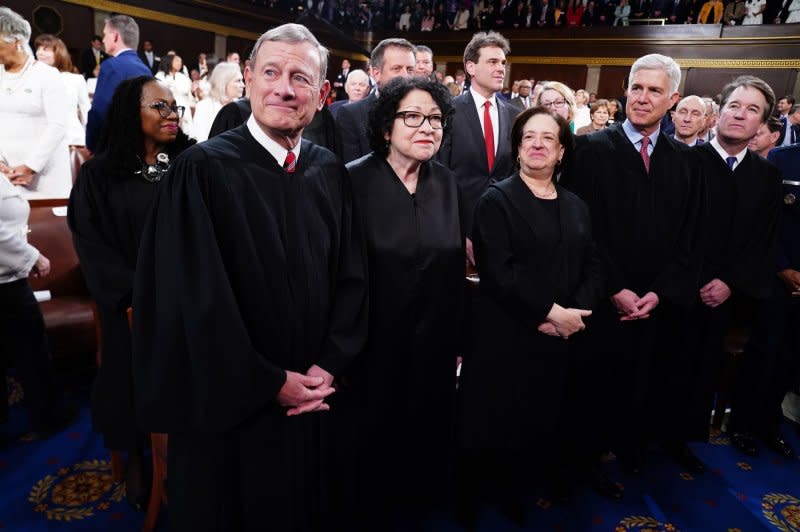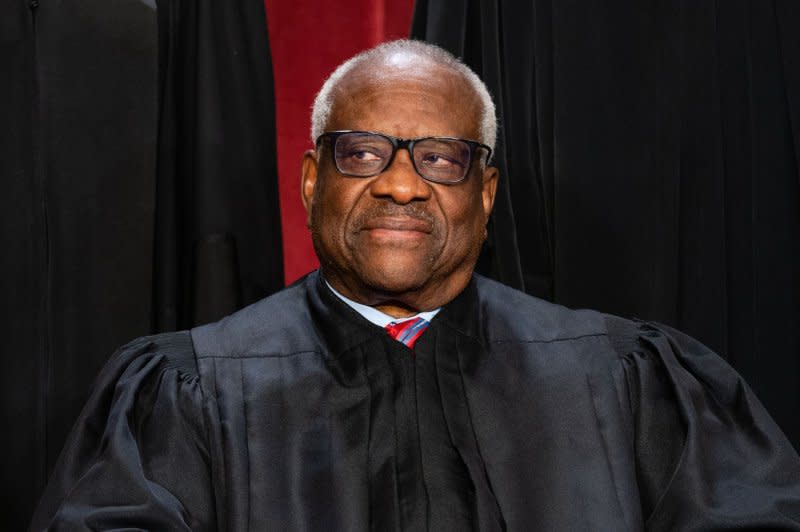Supreme Court rules to uphold gun bans for domestic abusers

- Oops!Something went wrong.Please try again later.
- Oops!Something went wrong.Please try again later.
- Oops!Something went wrong.Please try again later.
June 21 (UPI) -- The U.S. Supreme Court issued a ruling Friday that affirmed the government's authority to prohibit domestic abusers from owning guns.
The court ruled 8-1 in favor of upholding the federal law that bars people under restraining orders as a result of domestic violence from possessing a firearm.
The decision came down in the case U.S. vs Rahimi, following a complaint by respondent Zackey Rahimi. The Texas man was accused of assaulting a woman who is the mother of his child in 2019. She was granted a restraining order against him in 2020 and he was later connected to multiple shootings.
Rahimi argued that restricting him from having a gun based on a protective order against him is a violation of his second amendment right.
The ruling was a win for the Biden Justice Department, which appealed a lower courts ruling that called the statute unconstitutional.

In a statement from the White House praising the decision, President Biden noted his career-long efforts to prevent domestic abusers from purchasing guns, from his writing of the Violence Against Women Act three decades ago and, more recently as president, his support of the Bipartisan Safer Communities Act that prevents dating partners convicted of domestic violence from being able to buy guns.
"No one who has been abused should have to worry about their abuser getting a gun," Biden said in the statement.
Embattled Supreme Court Justice Clarence Thomas was the lone dissenting opinion.
The justices were not in complete agreement on the rationale behind their decisions. Chief Justice John Roberts wrote the majority opinion but five justices wrote concurring opinions.
Roberts' opined that the government is within its right to prevent "individuals who threaten physical harm to others from misusing firearms."
The majority stopped short of fully embracing the restriction as it is written. Roberts objected to the government's argument that Rahimi may be disarmed because he is not "responsible." Roberts wrote that the term "responsible" is "too vague."
Thomas argued that the restriction against domestic abusers is triggered without due process. He also writes that the government "fails to carry its burden of proving that [the restriction] is 'consistent with the Nation's historical tradition of firearm regulation.'"
The Supreme Court set a modern precedent in its 2022 ruling in the case New York State Rifle & Pistol Association Inc. vs. Bruen. The majority opinion in that case, written by Thomas, stated that the government must prove that its regulations are "consistent with the Nation's historical tradition of firearm regulation."
Roberts' opinion is that the Biden administration's policy "fits comfortably within this tradition."
Justice Amy Coney Barrett discussed in her concurring opinion the limits of viewing history through the originalist lens Thomas applies.
"It forces 21st-century regulations to follow late-18th-century policy choices, giving us 'a law trapped in amber,'" she writes. "And it assumes that founding-era legislatures maximally exercised their power to regulate, thereby adopting a 'use it or lose it' view of legislative authority. Such assumptions are flawed and originalism does not require them."
It is the second time in little more than a week that Barrett, also a conservative judge, has pushed back on Thomas' view of the weight that should be given to history by the high court.
"Tradition has a legitimate role to play in constitutional adjudication," Barrett wrote in her opinion in the case Vidal vs. Elster.
That case considered the use of a person's name -- in this instance, former President Donald Trump -- in a trademark without their consent. California attorney Steve Elster sought a trademark for the phrase "Trump Too Small" to be used on T-shirts that he was selling.
"In my view, the Court's laser-like focus on the history of this single restriction misses the forest for the trees," Barrett continued in her Elster opinion. "Eventually, the Court will encounter a restriction without a historical analogue and be forced to articulate a test for analyzing it."

